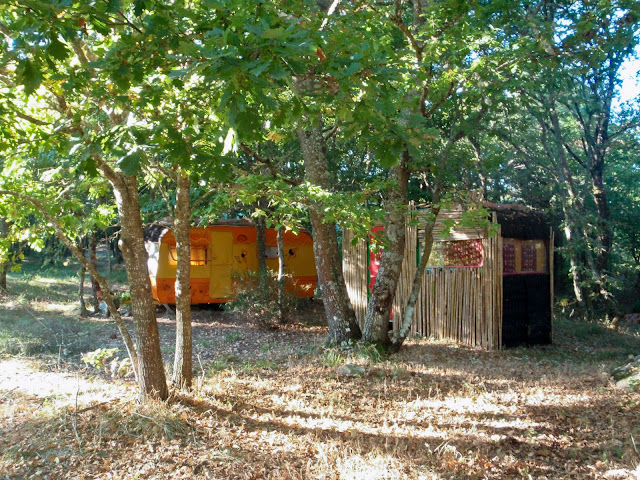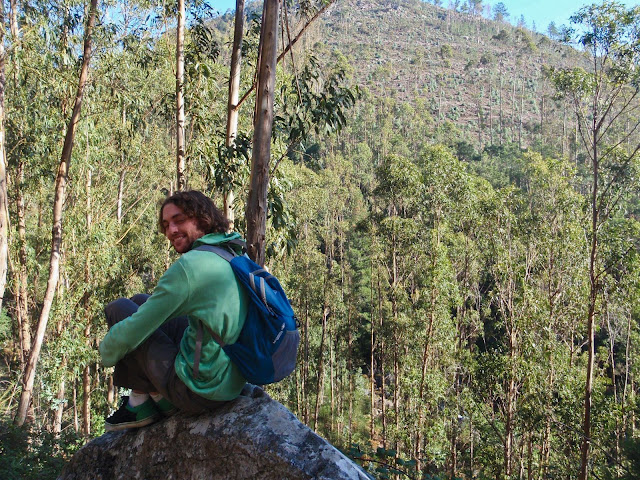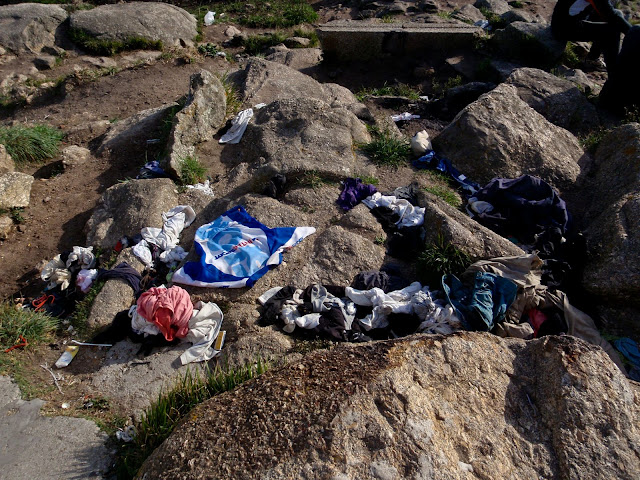
In the North West of Spain is an autonomous community called Galicia. Near the middle of Galicia is a city called Ourense. Near Ourense is a town called Monforte (de Lemos). A 20 minute drive from Monforte and you’re in a village called Ferreira. Half an hour walk from Ferreira is a farm house called Tanquian. About 300m from Tanquian is a caravan, which is where I lived for 2 weeks.

This is all part of a beautiful international organisation called Wwoofing, where I work for free on an organic farm in exchange for free food and accommodation. I think it’s a pretty good deal for the farm and without it some places would struggle to survive – all the more reason to do it and support organic farming – but its also good after being on the road for such a long time, both financially and to relieve the stress of constantly moving (yes, it definitely does exist). It’s of course a great way to learn about organic farming and a little bit of physical work was certainly well overdue. In the 2 weeks I collected apples (from the ground), capsicums, tomatoes, basil (red and green), apples (from the tree), chestnuts, walnuts, eggplants, zucchinis, corn, carrots, parsnips, apples (from the ground after shaking them from the tree (2000 from one tree!)), pumpkins, potatoes, cracked open hazelnuts, made 150L of apple juice, 100 jars of tomato and veggie sauce, 55 jars of chutney, weeded clover, rotary hoed 3 gardens, fed the chickens and of course shovelled shit. The nights were cold, about 0 degrees in my unheated rather poorly insulated caravan, which made it easy to blow out the candles because I could see my breath. It didn’t make it easy to get out of bed early though, especially being dark until 8.15 and foggy until 11.00, 12.00 or sometimes even 14.00. During the sunny afternoons the farm, located in a valley amongst the surrounding hills, was gorgeous. The house is a magnificent mansion of some lord a few hundred years ago (do I exaggerate? I’m not sure). It has been separated into 2 residences. The fresh food was of course delicious, and the family was very welcoming, but the neighbours of the other half of the mansion were crazy. They have hated and been aggressive toward Emily and her family since the day they moved in 17 years ago. They have instigated dozens of court cases and made threats regarding the children’s well being. As just a single example of their true craziness, they own 2 CD’s, which contain a total of 23 songs, and have been played on repeat very loudly into the garden almost every day for the last 10 years, as a form of mental torture.

The highlight was my Saturday night out. I walked down to the village, which has 5 bars, with about 5 people in each. One bar had about 15. After a couple of beers watching a game of football that didn’t interest me, I was done and on my way home, when I bumped into Lily and her friends, all aged 15 or 16, waiting for a bus to go out in Monforte. I felt like a dirty old man, but with no other options I went for it. Monforte was alive with young people (apparently kids as young as 11 can be seen drinking in bars). The pub we went to was brilliant! They were playing rock music all night, which I’ve missed after copping pop crap everywhere. I made friends with the barman and his mates on my side of the bar instantly. When we left in search of another bar and then returned 15 minutes later it was high fives all round. By 3.30 I had had enough and was one of only two people on the bus home, the typical Spanish opting for the 6.00 option.
The capital of Galicia is Santiago. Many people, historically religious, like to walk to there, and call it Camino de Santiago. One of the most popular walks starts in France and takes 30 days, but others take months from all parts of Europe, as far as Norway. I caught a bus, it cost $14 and took 3 hours, a much smarter option. I couch surfed with Danel, a local bloke, by which I mean Galician, not Spanish. Galicians are their own people with their own language (although not very well recognised by the Spanish government), most likely related to Irish/Gaelic. I stayed 4 nights and it was brilliant. I met a heap of his friends, mainly students from Portugal, Hungary, Italy and of course Galicia, went to one’s house for dinner and went out partying with many of them for 2 big nights. The partying was done in true Spanish style, starting quietly, bars at about midnight and then a more club like scene from about 2 till 5 or 6. In a not dissimilar manner to which Madrid felt like a town, Santiago gave an impression of a village of 80,000 (plus 20,000 students). On my first day in an internet cafe a girl helped me with directions and farewelled me with a friendly pat on the shoulder and ‘enjoy your time in Santiago’. About 20 mins later, whilst following those directions with my head in my map , I clumsily walked behind a car which was parallel parking. The driver finished his manoeuvre, got out wearing his suit and tie and said something to me as he crossed the street with his briefcase. My standard response of ‘no entiendo’ was appropriate, to which he crossed the street again, this time somewhat more purposefully, toward me and asked ‘where are you going?’ Another friendly hand on the shoulder and I was on my way. I would love to see someone in Melbourne rushing to a meeting behave the same way. It’s not as if this city lacks tourists, quite the contrary.

For my last day I hired a car and went for a drive with 3 of Danel’s girl friends. We went hiking through the hills and along a river to some pools. It was so nice to be out right amongst nature, but again, surrounded by gumtrees I could have easily been at home, expecting a kookaburra to laugh at us at any second. We continued on to a nice beach and then to the end of the world. This is a point which is possibly the furthest West in Spain, but with the remnants of a scrub fire and all of the clothes that people have dumped (presumably at the end of their extended camino) the name seemed a little too fitting.


For more pictures, click here.
